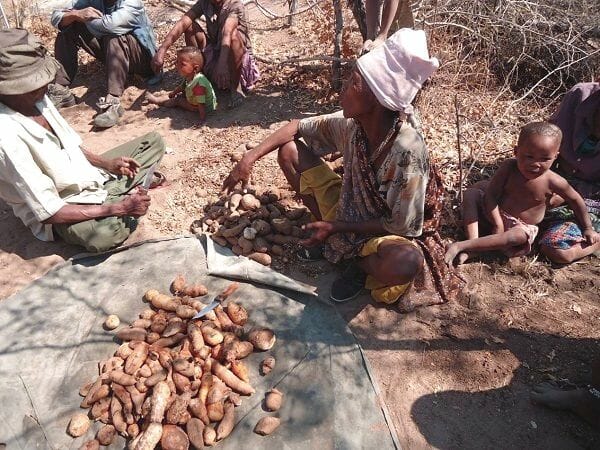
San communities grow more independent following bumper Devil’s Claw crop

Devil’s Claw, the unobtrusive bush found widely in the Kalahari Sandveld of Namibia’s eastern regions, is coming into its own right as a significant cash income for the local communities who harvest the tubers for export. Good rains earlier in the year and rising prices for this natural product, together have given the industry a considerable boost.
This week the Nyae Nyae and N#a Jaqna conservancies reported that they have already earned almost N$2 million from harvesting, processing and selling Devil’s Claw tubers. Once the full harvest is in and sold, the income is anticipated to total about N$2.6 million.
For both conservancies, EcoSo Dynamics exports Devil’s Claw on their behalf under a long-standing contract. The Managing Member of EcoSo Dynamics cc, Mr. Gero Diekmann, said the partnership is important and has been built on mutual trust over the last decade. This has enabled the exporter, together with the conservancies, to put in place a traceability system so that every single bag can be traced to the harvester and the locality.
The rotational harvesting system and sustainable harvesting methods diligently followed by harvesters allow them to benefit on the marketing side by promoting the green foundation of the whole harvesting process.
To date, in the Nyae Nyae conservancy approximately 200 harvesters have sold 18.7 tons of Devil’s Claw while in N#a Jaqna, some 275 harvesters produces 21.7 tons. The purchase price, negotiated at the beginning of each harvesting season, reflects the price paid for organically certified Devil’s Claw, sustainably harvested, quality assured and fully traceable.
The purchase price of Devil’s Claw increased considerably in 2017, particularly in Nyae Nyae since the conservancy entered into a partnership arrangement with the buyer to obtain Fair for Life Certification, a form of Fair Trade certification.
The concept behind Fair for Life certification is that producers from disadvantaged communities can influence their own development by together deciding on meaningful projects that can be adapted to their local conditions. Fair for Life ensures that organizations and companies are committed to build respectful relationships, ensure fair working conditions and respect the environment within and along their supply chains.
An important factor that contributes to the success of the Devil’s Claw in both conservancies is the consistency created by having a reliable buyer with proper contracts in place. “Everybody involved knows their roles and responsibilities,” the conservancies stated. About 75% of their income is derived from Devil’s Claw.
Support is currently given to both conservancies to help them negotiate prices, comply with Organic Certification and Fair for Life guidelines and ensure sustainable harvesting. This support, implemented by the Nyae Nyae Development Foundation of Namibia, is funded by an EU Climate Change Adaptation grant. Each year the support is reduced to enable greater independence of the conservancies and improved sustainability of the San communities.










































